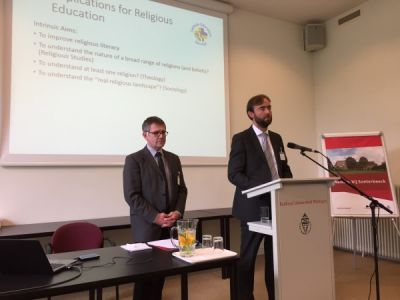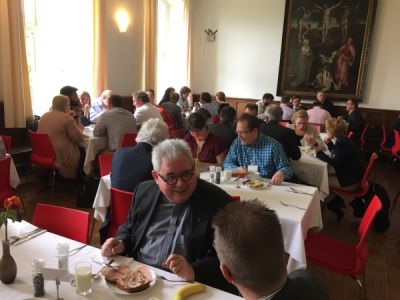The mission of Catholic schools and religious education
Religious education in catholic schools


Radboud University organised a conference on the current challenges and opportunities in catholic education and religious education in catholic schools, which took place in Soeterbeeck, a conference centre of the University near Ravenstein. At the start of this conference I was to read a personal message sent by Archbishop Angelo Vincenzo Zani, secretary of the Congregation for Catholic Education. The archbishop greeted and encouraged the participants to promote a culture of encounter. I continued with my introduction to the conference that you find here below.
Different countries
In the conference took part invited representants of catholic education in Scotland, England and Wales, Belgium and the Netherlands. Prof. Lieven Boeve (Belgium) presented his idea of a catholic dialogue school, Philip Robinson adressed the issues catholic education in England and Wales have to face (see picture). After lunch the situation in the Netherlands (prof. Chr. Hermans) and Scotland (dr. Leonardo Franchi) was presented.
Mass
At noon we celebrated Mass. In my homily I stressed the importance of the personal encounter between educator/teacher and pupil, of the testimony given by those who work in a school and of their capacity to dialogue, which requires a profound and personal knowledge of faith.
The mission of catholic schools and religious education
The Church' vision of religious education and catholic schools as it is expressed in the 1983 Code of Canon Law and in numerous post-conciliar Church' documents on this matter, is based on the teaching of the second Vatican Council. Due to the teachings of the second Vatican Council religious education has obtained a new significance and role in Catholic schools.
The council documents
The ecclesiology of the dogmatic constitution Lumen gentium, the principles of lay apostolate according to the decree Apostolicam actuositatem, and the contents of the declaration on religious freedom Dignitatis humanae have influenced all in a considerable way a concept of catholic schools as unfolded in the Code and other post-conciliar documents. The declaration on catholic education Gravissimum educationis, which deals explicitly with catholic schools, has to be read together with and within the context of those other documents. Only in this way can we get a full understanding of what the catholic Church considers to be a catholic school and what place has to be attributed to religious education.
Developments anterior to the Council
Before the second Vatican council, according to the 1917 Code of Canon Law Catholic religion had to be taught in every school(c. 1373 ' 1). If this was really so, in some way the school was considered to be a Catholic school (c. 1379 ' 1: "..scholae catholicae ad normam can. 1373.."), even if it were a State school. It is only in later Church’ documents that Catholic schools are supposed to be Church' schools. This viewpoint is expressed very clearly in the encyclical letter on christian education Divini illius magistri, published the 31st of december 1929 (in: AAS 22(1930), pp. 49-86) and translated from the original Italian, under the title Rappresentanti in terra, clearly written against fascism. In this Encyclical letter Pius XI took a new step: it is not enough to have a Catholic religion-class in a school, but religion has to be the foundation and crown of a Catholic school.
Subsidiarity
A fundamental principle of Catholic social doctrine, developed by the same pope Pius XI was very well fitting into this view on catholic schools, that could no longer be state schools where religion was taught: according to the principle of subsidiarity the State authorities should give freedom to the citizens and their organizations to do themselves what they were able to do. What easily and readily can be done by persons and by organizations close to the individuals, should not be usurped by organizations on a higher level and by the State. Thus the Church' social doctrine prefers organizations closer to those human beings in whose service the work of these organizations is done. Therefore, parents and organizations - among them the Church - that express their opinions and ideals, should have the possibility to establish and manage schools (cfr. P. PIUS XI, Encycl. Quadragesimo anno, 15 mei 1931, Denz. 3738).
Scolastic liberty and concept of State
The second Vatican Council deliberated on a Catholic view of State and civil society. In its declaration on religious freedom Dignitatis Humanae a new concept of State and civil authority, deduced from the dignity of each human being and the natural right of a person, sheds new light on the question of educational freedom. Scholastic liberty, according to Dignitatis humanae 6 forms an essential part of religious freedom. The family is called "a society in its own original right". The parents have the right to guide their children and to determine the kind of religious education their children are to receive. The government does not have authority to impose a certain type of education - without prejudice to laws concerning level and civic education -, but it has to acknowledge the right of the parents to chose the school fitting to their moral and religious convictions. No unjust burdens may be imposed on the parents because of their choice. This last pronouncement points to a just assignation of public funds (cf. GE 6): the schools which are selected by the parents in a sufficient number have a right to be subsidized. No distinction should be made, based on the school’s religious signature. The right of education first of all belongs to the parents. A scholastic State-monopoly as well as an obligation to attend classes which are not in agreement with the religious beliefs of the parents would be unjust (DH 5). A school established by parents or by institutions close to the parents would be even preferable, because of the principle of subsidiarity.
Lay apostolate
Another very important document clarifying the nature of Catholic schools is the decree on lay apostolate, Apostolicam Actuositatem (AA) which finds an application also in the decree Christus Dominus (CD) on the charge of the bishops in the Church. The Council stressed that all Christ's faithful belong to the People of God and are called to contribute to its mission. Lay people as well as the other members of the Church take part in the threefold task of Christ as a prophet, priest and king. Every activity that contributes to the establishing of the kingdom of God is a fulfillment of the Church's mission and is called "apostolate" (AA 2-3). And the declaration on Catholic education, Gravissimum Edcuationis 8 stresses that the work in the field of education is an apostolate.
Apostolate of the people of God
From the council’s documents we draw the conclusion that a Catholic school as such is seen as an important apostolate in which many members of the people of God can and should be involved. A Catholic school is seen as a major apostolic initiative taken by members of the Church' community, though non-Catholics can be involved as well - and implanted in the right way into the life of the Church.
The 1983 Code of Canon Law proceeds along these lines: Education in general and more specifically school-education are depicted as a mission of the whole people of God. Every member of the Church has to play his role. If the Code deals with the duty and the right of the Church to educate (c. 794 §1), the word "Church" has to be understood as "the people of God", all its members, because all the faithful have to contribute to the goal of education: "to arrive at the fulness of Christian life" (c. 794 §1). Of course, Catholic schools are characterised by the institutional link they keep with the Church hierarchy.
Human development
Both the blessed Pope Paul VI and Saint Pope John Paul II stressed the importance of Catholic schools because of the need to express faith in life and culture. In doing so they were developing the viewpoint of the declaration Gravissimum educationis. Instruction in schools should aim at the formation of the whole person. Knowledge and science have to serve human development and have to be integrated therefore in an overall view on humanity and the human person. Science which is not integrated in an overall vision, is not human. Certainly, the scientific requirements of each discipline have to be fullfilled, but at the same time the different topics have to be selected and have to be studied in such a way that it contributes to real education of the whole person. Schools must prepare for life. If one would like to exclude this educational goal and to restrict himself to scientific instruction, this too is an expression of a certain educational philosophy.
A specific type of religious education
Of course, the school environment requires a specific type of religious education. As the Circular letter on religious education in schools, issued by the Congregation for Catholic education (5th of may 2009) puts it: “Religious education is different from, and complementary to, catechesis, as it is school education that does not require the assent of faith, but conveys knowledge on the identity of Christianity and Christian life. Moreover, it enriches the Church and humanity with areas for growth, of both culture and humanity”.
Development in the concept of a catholic school
A change can be noticed therefore in the view Church’ documents have on catholic schools and religious education: from a school that was denominated ‘catholic’ because catholic religious instruction was imparted even if it were a State school, the concept shifted to a school that is catholic because the educational project is so, religious education being part of it.
Integral education
The eminent educational goal of the school is the reason why Catholic schools are needed. A Catholic school is not there just for religious formation, but in a catholic school faith is expressed in culture, in life; there we find a connection between faith and science, a climate made possible by the testimony of life of those working together in the Catholic school: "in the community formed by the Catholic school, the power of the Gospel has been brought to bear on thought patterns, standards of judgment and norms of behaviour". It is therefore that Catholic schools are considered to be such an important apostolate even if sometimes religious education cannot be imparted in class explicitly for instance in an Islamic country where the pupils are predominantly muslims. But however religious education should always be part of the expression of a general Catholic educational apostolate. “Schools ... are living environments, where an integral education is provided, that includes religious formation” (Congregation for Catholic education: Educating today and tomorrow: a renewing passion, III, 7th of april 2014).
I hope this conference will inspire many to live this educational mission in catholic schools and through religious education.
Haarlem, 18th of May 2016 +Jan Hendriks


















